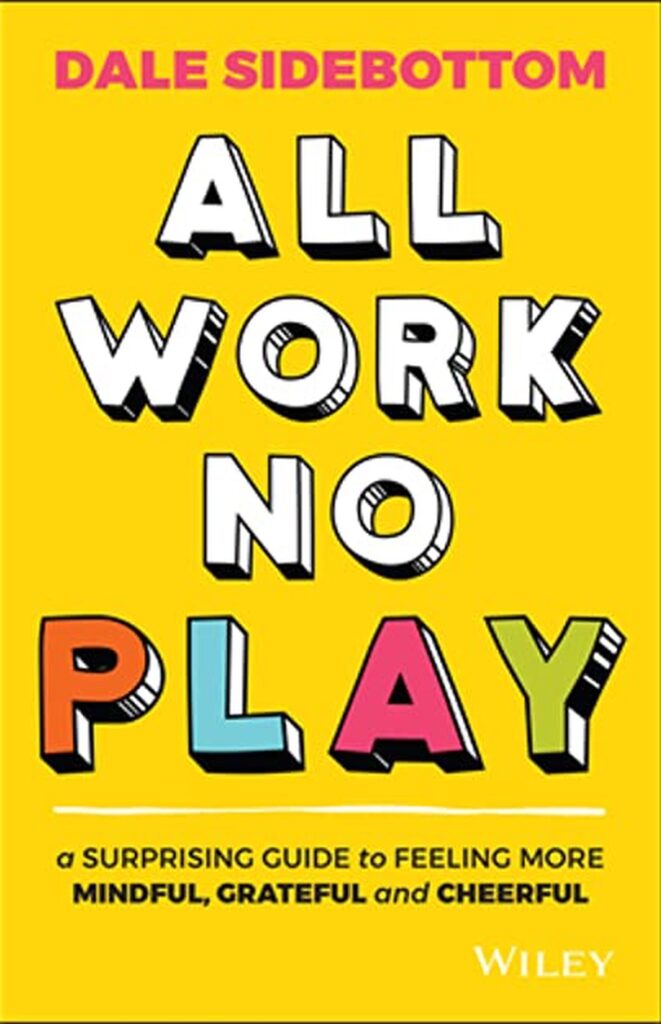Sharing my learnings from the book, All Work No Play by Dale Sidebottom
All Work No Play by Dale Sidebottom
All Work No Play: A Surprising Guide to Feeling More Mindful, Grateful and Cheerful is a practical and rewarding handbook for reconnecting with joy and happiness daily. The book shares strategies for play-based mindfulness, empathy, and gratitude exercises that will help readers rediscover their inner child; promote good mental health; build and foster more meaningful connections with others; and help combat loneliness and deep-rooted toxic behaviors and thoughts.

- Dale Sidebottom had hit rock bottom. At the age of 30, he was divorced and homeless, sleeping on his cousin’s couch. how did someone like Dale end up in such a tough spot?
- Through professional counseling, Dale found the answer – he realized that a decade-long addiction to work had taken its toll. Through time, effort, and support from loved ones, he began turning his life around. But he credits his recovery to one thing above all else: play.
- When Dale finally admitted to himself that something had to change, one of the first things he did was start scheduling playdates into his calendar. Eventually, Dale began having playdates while he was teaching or working; he incorporated fun into his lessons or into his work with a client. His mood improved almost instantly – play helped him be more present in the moment, and it reminded him to laugh and smile again.
- Play comes naturally to children, but it’s important at all stages of life.
- In his research, Dr. Stuart Brown of the National Institute for Play found that youth deprived of play in their early years were more likely to display antisocial behavior and commit crimes.
- According to Peter Gray, a psychology professor at Boston College, it’s fundamental to healthy human existence at any age – including adulthood.
- play is a part of life whether you’re doing it intentionally or not. That’s because it’s innately human.
- There are all kinds of play: it can be structured or unstructured; scheduled or spontaneous; a specific activity or simply a state of mind.
- play-specific activities, which, as the name suggests, are designed to engage you in play. Think board games, video games, escape rooms, trivia, charades, and puzzles. You can bring more play-specific activities into your life by scheduling a weekly game night
- playful mindset is all about bringing a sense of spontaneity, adventure, or light-heartedness to daily life. And for the introverts: daydreaming can be a perfectly playful mindset
- bringing play into activities you don’t necessarily associate with it.
- Play helps build connections and deepen relationships.
- Play is how we create lasting memories, and it can make the time your family spends together feel unique.
- For play to succeed in professional settings, make sure you set up a conducive atmosphere. When done right, office play has been shown to boost productivity, teamwork, and performance!
- Engaging in activities that are fun and joyful relieves stress and improves your mood by releasing endorphins and dopamine. Play also supports brain function by preventing memory problems and fostering creativity.
- Dale Sidebottom has come to think of play as a form of mindfulness because it helps him to let go and be completely in the moment. Researchers refer to this as a flow state
- That’s why Dale coined the term play-based mindfulness, which is a powerful approach to living. It’s a set of practices that help bring the well-being benefits of play and mindfulness into your life.
- it is time to slow down and reconnect with the things that bring us joy. Dale developed a daily practice centered around Play, Exercise, Gratitude and Giving – or PEGG for short.
- start every morning and finish every evening with the following simple routine
- sit down with your morning coffee or breakfast, and answer three questions: “What am I excited about today?”; “What will challenge me today?”; and “How can I surprise somebody today with an act of kindness?”
- get up and spend ten minutes doing some Exercise. Moving your body will help wake you up and give you a rush of endorphins.
- finish the morning with presence and calm by practicing simple breathing exercises or a few minutes of meditation.
- you can go about your regular day
- Dale recommends capping the evening off with three more reflection questions, “What are three things I’m grateful for?”, What form of play did I do today and how did it make me feel?” & “What did I learn today?”


Leave a Reply